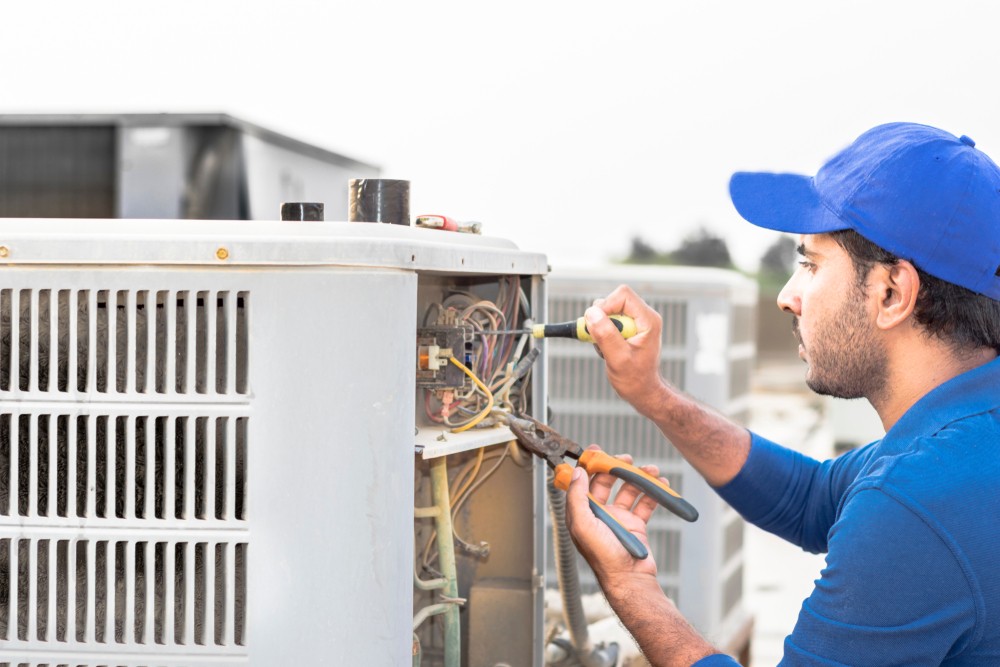Beat the Heat This Summer: 8 Maintenance Steps for AC Units

As industrial facilities and factories gear up for summer, ensuring optimal air conditioning (AC) performance becomes paramount. A cool and controlled environment safeguards the well-being of employees, prevents heat-related equipment malfunctions, and maintains consistent production output. Here’s a breakdown of essential AC-unit maintenance tasks to tackle before the summer heat ramps up:
1. Replace air filters.
Industrial environments generate significant dust and airborne particles. Clogged air filters are the most common culprit behind inefficient AC operations. Regularly check and replace air filters, ideally monthly during peak summer usage. Upgrading to high-efficiency pleated filters can help — they trap finer particles and extend the lifespan of your AC unit.
2. Clean coils.
Both the evaporator coil (indoor) and condenser coil (outdoor) play a vital role in heat exchange. Grime buildup on these coils significantly reduces heat transfer and efficiency. Schedule professional cleaning for condenser coils before summer, and technicians will remove debris, leaves, and dirt accumulated around the unit. And be sure to clean evaporator coils according to the manufacturer’s instructions, ensuring proper safety precautions are followed.
3. Inspect ductwork for leaks and blockages.
Leaking or blocked ducts compromise airflow and the effectiveness of cooling. Conduct a thorough inspection of ductwork for any tears, gaps, or loose connections. Seal any leaks with mastic sealant, ensuring a tight fit. Look for signs of debris within the ducts, especially around terminal ends. Schedule professional duct cleaning if necessary, particularly if your facility handles significant dust or particulate matter.

4. Prevent mold and water damage.
Clogged condensate drain lines can lead to water accumulation in the AC unit, which can result in mold growth and potential water damage. Regularly inspect and clean the drain pan and drain lines to ensure unobstructed water flow. Technicians can use pressurized air or specialized tools to clear any blockages.
5. Tune up thermostats.
Inaccurate thermostat readings can lead to excessive cooling cycles or an uncomfortable work environment. Schedule a calibration check for your thermostats to ensure they accurately reflect the desired temperature. Consider upgrading to programmable thermostats, allowing for preset cooling schedules that optimize energy usage during off-peak hours.
6. Optimize airflow.
Inspect the condition of condenser fan blades for any damage or warping. Ensure the fan motor spins freely without any obstructions. Lubricate fan motor bearings according to the manufacturer’s recommendations to minimize friction and noise.
7. Recharge refrigerant.
Low refrigerant levels can drastically reduce cooling capacity. Since refrigerant handling requires certified technicians due to environmental regulations, it’s best to contact a qualified HVAC professional for inspection and potential recharge if you suspect a refrigerant leak.
8. Schedule preventive maintenance.
A comprehensive preventative maintenance plan conducted by a licensed HVAC professional is vital for industrial AC units. Technicians will perform a detailed inspection, identify potential problems early on, and ensure your AC unit operates at peak efficiency throughout the summer.
By implementing these essential maintenance practices, industrial facilities and factories can ensure their AC units operate efficiently throughout the summer. A cool and comfortable work environment doesn’t just improve employee productivity; it also safeguards vital equipment and processes from heat-related downtime.